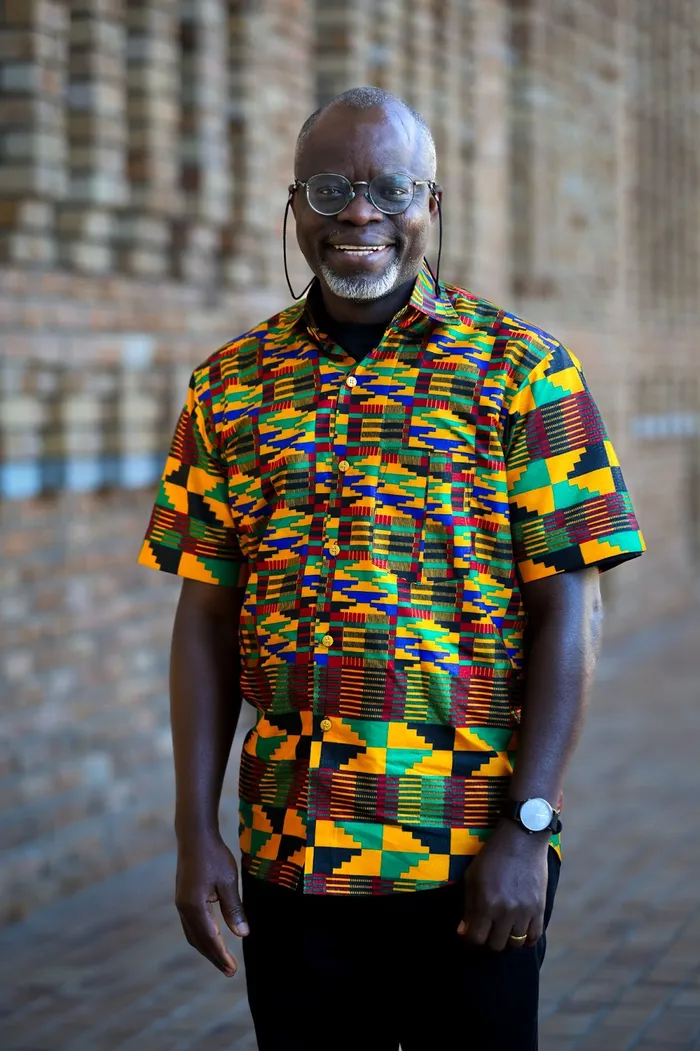Exploring Africa's role in shaping the global legal order: Prof Iyi's inaugural lecture

Prof John-Mark Iyi will deliver his inaugural lecture on 23 September 2025.
Image: Shelley Christians
Professor John-Mark Iyi promised his older brother, Godwin, that he would complete his PhD before getting married and starting a family. He kept that promise and worked hard to achieve academic success that far exceeded his family's expectations. On 23 September 2025, Prof Iyi will deliver his inaugural lecture at the University of the Western Cape (UWC) titled: Beyond Crisis and Credibility in International Legal Reform: Africa at a Critical Juncture, promising a bold and timely interrogation of the global legal order and Africa's place within it.
Prof Iyi's academic contributions include his book Humanitarian Intervention and the AU-ECOWAS Intervention Treaties under International Law: Towards a Theory of Regional Responsibility to Protect (Springer, 2016), and co-editing Boko Haram and International Law: Mapping the Legal Terrain for Accountability (Springer, 2018). He is also a C1 National Research Foundation (NRF) rated researcher and a leading voice in African legal scholarship.
Currently serving as Director of the African Centre for Transnational Criminal Justice at UWC, Prof Iyi's career spans more than two decades, starting in Nigeria, with academic stints in Norway, the USA and South Africa.
His academic journey began in Benin City, Nigeria, where he was shaped by student activism and political unrest. His enrolment as a first-year student at the University of Benin coincided with Nigerian military leader General Sani Abacha seizing power. Abacha disbanded elected bodies, removed civilian governors, and banned political activities, beginning a period of military rule that included significant human rights violations.
During a student protest, police fired rubber bullets, one of which struck Prof Iyi's leg. While being treated in the hospital, he encountered someone who would change his life: "When I woke up, there was this nurse who had once treated my older brother at the same hospital, and she recognised the surname. She said to me, 'Don't do this to your parents, have compassion on your parents.'
"I was pondering, reflecting on those words and my brother's words, and I became a completely different person. No more politics, no more student activism, just books and studying. I then became really immersed in my academic work."
This pivotal moment redirected Prof Iyi towards academics and legal scholarship, keeping his promise to his brother whilst heeding the advice of the nurse who treated him. Since then, he has consistently explored the intersection of law, justice, and Africa's marginalisation in global governance.
In his inaugural lecture, Prof Iyi will argue that the current international legal system, born from colonial expansion and global conflict, has reached its expiry date. He contends that Africa is presented with a historic opportunity to reshape the global legal order, akin to the post-colonial "Bandung Moment." His vision is anchored in three key pillars: assertive continental sovereignty, extra-legal norm entrepreneurship, and a decolonised international legal policy.
"International law as it is, in my view, cannot be the vehicle for justice in its current state," Prof Iyi explained. "It was designed as a tool for dispossession and subjugation. If it is to redress injustice, its essence must change, or we must think of another tool."
His inaugural lecture will not only reflect on the failures of the current system, but also offer a roadmap for Africa's proactive engagement in shaping a new international legal order - one that is inclusive, just, and reflective of the continent's historical experiences and future aspirations.
Prof Iyi emphasised the urgency of this moment: "The current global crisis is a critical juncture for Africa to contribute to shaping a new international legal order. We must amplify the marginalised voices of Africa in global legal discourse. Every system has a lifespan. The current international legal order has reached its expiry date."
He argues that the global legal order is teetering under the weight of its own contradictions, and his lecture arrives at a crucial juncture in world politics. Prof Iyi's critique of international law represents not merely theoretical discourse, but a compelling demand for transformation.
Related Topics: